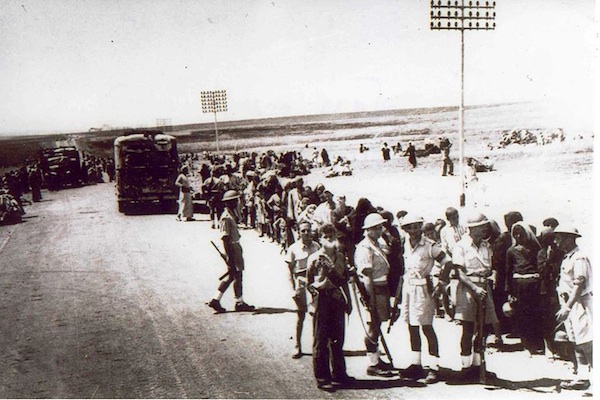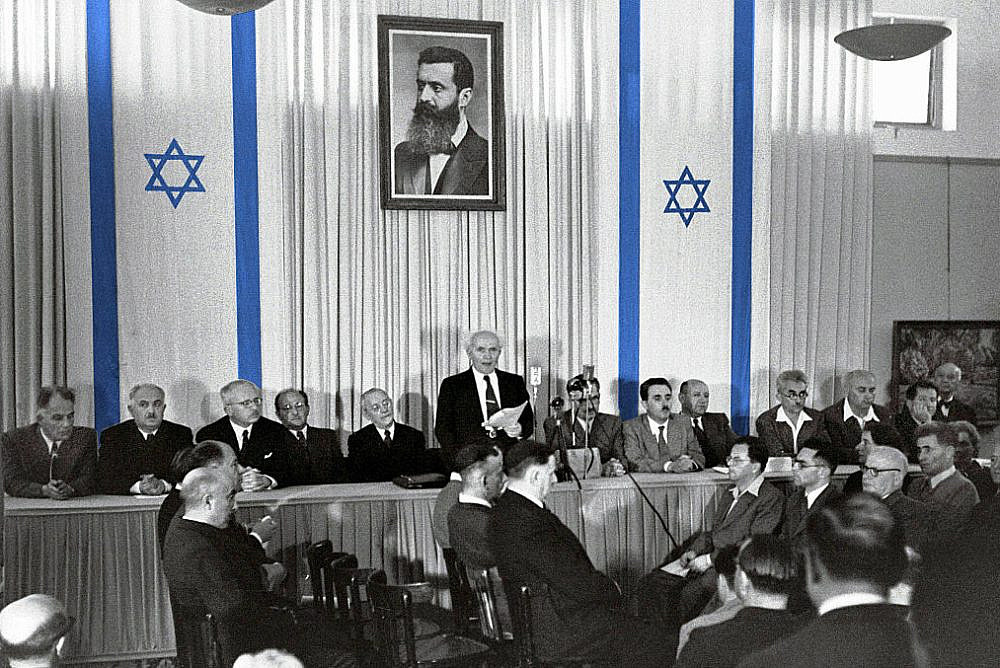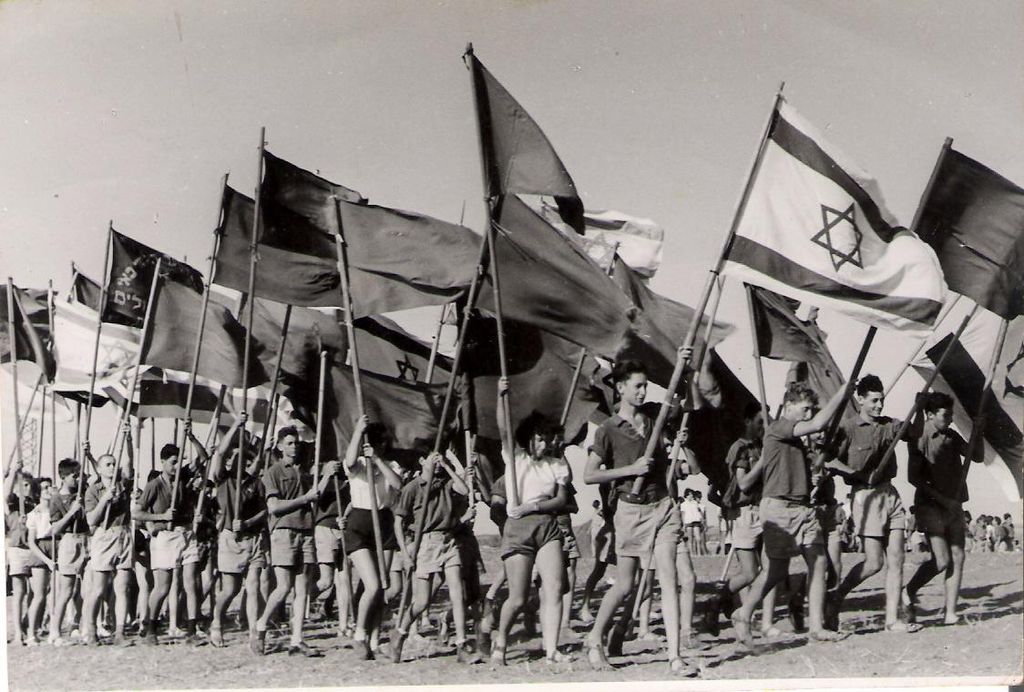President Trump’s executive order on Dec. 11 does not mention Zionism or anti-Zionism, Israel or Palestine. Yet it has produced a heated debate about all four issues, in particular the relationship between anti-Zionism and anti-Semitism. Much of this debate is taking place as if we have an agreed-upon understanding of these terms and how they are interrelated. It would be worthwhile to reflect on these issues in order to clarify the questions facing us today.
At its core, Zionism — the ideology, political movement, and settlement project born in late 19th century Central Eastern Europe — regarded Jews as a national group in need of an independent homeland or state of their own in which they would be secure from persecution. That homeland was to be their “old-new” ancestral territory: the historic land of Israel, which was then the Arab-inhabited land of Palestine.
Understanding Zionism, as well as global attitudes toward it, requires looking at the historical context in which it emerged, with three crucial dimensions. The first was the emergence of ethno-nationalism in the declining land-based empires where most Jews lived at the time — the Russian, Austro-Hungarian, and Ottoman empires — that saw minority groups seeking independence from their imperial overlords. The second was the final stages of colonial expansion of the maritime empires — Britain and France in particular — which saw large parts of Asia and Africa fall under foreign domination. The third, which developed later, was the decolonization of the old empires’ domains and the rise of new forms of imperial rule, leading to the Cold War and its aftermath.
In its early decades, Zionism failed to capture the allegiance of most Jews. Some of them publicly adopted anti-Zionist positions and rejected the call for a territorial concentration of Jews in their own state. These positions were variously motivated by religious, leftist, and liberal world views.
The majority of Jews were not actively opposed to Zionism but did not follow it either ideologically or practically. Instead they favored other options: integration as equals in their countries of residence (on an individual or group basis); assimilation into the dominant cultures; or immigration to greener pastures where Jews could live free of old European prejudices against them, such as in North America, South America, and South Africa.
In contrast to these courses of action, Zionism called on Jews worldwide to settle in Palestine. Some did so during the first stages of the Zionist movement, but not necessarily due to ideological commitment. In fact, many Jewish immigrants moved and settled there under duress and lack of better options — most notably Polish Jews in the 1920s and German Jews in the 1930s, whose route to the West was blocked by restrictive legislation.
Still, hundreds of thousands of Jews moved to Palestine, increasing the local Jewish population from 50,000 at the end of World War I in 1918, to 450,000 on the eve of World War II in 1939. It was not only the growing numbers that mattered: during that period, Jews bought large swathes of land, established dozens of new urban and rural settlements, and built extensive economic and institutional infrastructure under the leadership of Zionist agencies.
Naturally, Palestinian Arabs opposed the Zionist-led immigration, land acquisition, and political development in their land from the movement’s inception. However, they had little interest in Zionism as an ideology of Jewish nationhood and identity: the focus of the Palestinian national movement has always been on the practical consequences of Zionist settlement as it affected them directly. That it was carried out by Jews specifically was of very limited concern, and that remains the case today. Some negative attitudes toward Jews may have emerged as a result of confrontation with Zionism, but these were an outcome, not a cause, of resistance to a political project seen as aiming to displace and replace them.
In the 1940s, following World War II and the Holocaust, the founding principle of Zionism — the need for a safe homeland or state for Jews — gained widespread international support and became a majority position among Jews. Even then, most of those who migrated to the new State of Israel continued to do so for lack of better options, particularly due to physical displacement and difficult political conditions in post-war Eastern Europe, and a growing sense of insecurity and political exclusion in the Middle East and North Africa. Ideological commitment still played a minor role in this process. The perception of Zionism as providing a refuge for Jews in desperate circumstances, and doing whatever it took to ensure their survival, eventually became cemented in the minds of Jews themselves and the wider world.
Nevertheless, this form of Jewish survival exacted a heavy price. Israel was built on the ruins of Palestinian Arab society, and its creation resulted in their large-scale ethnic cleansing, fragmentation, and exile. Opposition to Israel thus became widespread in the Arab and Islamic worlds. Some of that opposition was occasionally expressed in anti-Semitic discourse and actions, but was almost invariably an outcome of the outrage over the dispossession of Palestinians, not its cause. This largely remains the case to this day.
Globally, Zionism has simultaneously been viewed as a form of national self-determination and as a form of colonial rule over the land’s indigenous people. For Palestinians, Zionism means dispossession and disenfranchisement; for most Jews, it means supporting the notion of a Jewish state. The precise implications of the state’s Jewish character, its relation to Judaism as a religion, its practical consequences for Jewish and non-Jewish citizens alike, and its boundaries and policies, are all internally contested. There is no unified Zionist position on these matters, and there never has been.

Against this backdrop, for most solidarity activists today, anti-Zionism means rejecting the notion of Israel as an exclusive Jewish state in which Palestinians are subjected to an inferior position or are excluded altogether. In practice, anti-Zionism means support for equality, justice, and redress for Palestinians living as second-class citizens, occupied subjects, or stateless refugees. It means supporting the right of Jews to live as equals in Israel-Palestine, and any other place of residence, without special privileges or liabilities. This goes beyond opposition to specific policies, such as the 1967 occupation or the siege on Gaza, which does not require an anti-Zionist position.
The key contestations in the internal Jewish debate over Zionism in the pre-1948 period are of much interest to academics. However, they have become marginalized in the public discourse due to many activists’ focus on Israeli policies alone. Those questions remain pertinent today: are Jews a nation, ethnicity, religion, or a combination of all? Do they need a state of their own? Is the diaspora an anomaly or a permanent, perhaps desirable, feature of Jewish existence?
In this context of solidarity and struggle, the division between liberal and radical perspectives hinges on the question of the Jewish state, which tends to separate Zionists from anti-Zionists. But that should not be an obstacle to mobilizing around shared practical concerns: opposition to the 1967 occupation and settlement policies, equality for Palestinian citizens, and so on. The rule of thumb here is to build a broad front based on what we have in common, while campaigning separately to different audiences on issues that divide us. The question of Zionism, as vital as it is, must not become a purity test that weakens solidarity where it can be built.
One way of ensuring this is the adoption of plain strategic language. The forces that implement the siege on Gaza, dispossess people of their land on both sides of the Green Line, and maintain Palestinians under occupation, are the State of Israel and its military and civilian agencies. They are aided and abetted by apologists (Jews and non-Jews alike) who act as hasbara agents overseas. It is not the broadly-labeled “Zionists” (let alone “the Zios”) who do all that. Rather, it is a concrete set of forces affiliated in various ways to the Israeli state apparatus.
The more we target concrete individuals, institutions, and policies, and avoid using vague and obfuscating terms, the better we can focus solidarity and resistance efforts, and effectively counter accusations of anti-Semitism as weapons used against the movement to end Israeli apartheid, and to achieve justice and equality for all.


